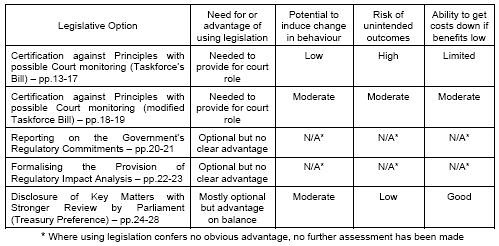Yesterday, Rodney Hide introduced his Regulatory Standards Bill to the house. The aim of the bill is to improve the quality of legislation by requiring Ministers to certify that new laws comply with a set of highly ideological "principles of responsible regulation". One of the less-contentious of these principles is that a law
be the most effective, efficient, and proportionate response to the issue concerned that is available.According to Treasury's just-released Regulatory Impact Statement [PDF], the bill clearly fails to meet that criteria. In fact, like Kate Wilkinson, Hide appears to have chosen the worst possible option. The short version is in the table below:

Rodney's bill is the top option. As can be seen, it ranks worse on every criteria than the other possible options. As for why:
- Rodney's preferred principles are highly ideological and therefore will have little buy-in, either from the public or from Ministers. This will reduce certification to a compliance exercise. Meanwhile, the requirement for dual certification by both Ministers and officials creates strong pressure on the latter to agree with the former, reducing the integrity of the process. Ministers aren't qualified to certify, and officials may lack the proper resources to do so.
- The interpretation clause and ability to declare legislation incompatible creates significant legal uncertainty, particularly given the vague nature of some of the principles.
- The resource requirements for certification are extremely high, and will continue to be high even if there is no benefit.
The two major options proposed addressed these flaws. The first of these modified the bill to remove the more ideological principles and the interpretation and incompatibility clauses. But given that this imposition of Libertarianism by stealth was the bill's real purpose, you can see why Hide rejected that option. Meanwhile, Treasury's second option - basically requiring Ministers to highlight potential problems in their bills, and beefing up Parliament's ability to address them either through enhanced select committee support or a dedicated Officer of Parliament would actually significantly improve things, while not costing a lot or tying us to Rodney's peculiar ideology. This option - the most effective, efficient, and proportionate one - was also rejected.
The upshot: if Rodney's bill was law, it would not itself be able to be certified as meeting its own principles. But that's hardly surprising. As noted above, the whole purpose of the bill is to impose those highly contentious and ideological principles, with a right to challenge primary legislation for non-compliance, so as to deter and undermine environmental, health and other regulation and protect the profits of existing vested interests. "Quality legislation" is just right-wing code for further kneecapping government and preventing it from working in the public interest.